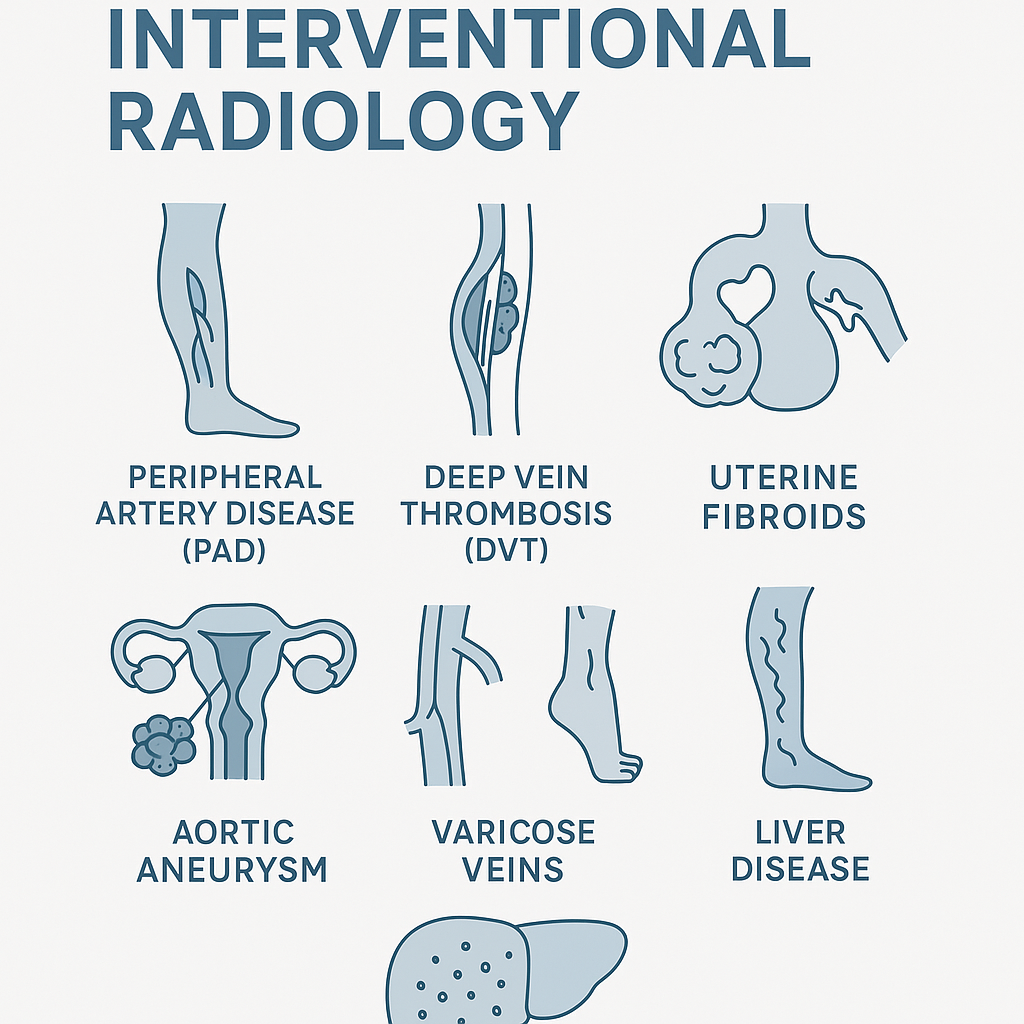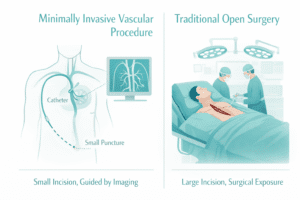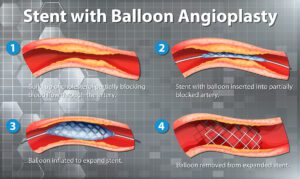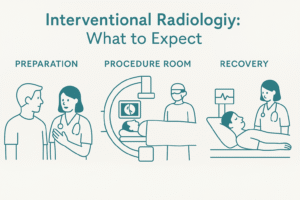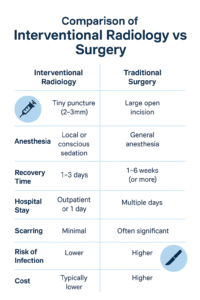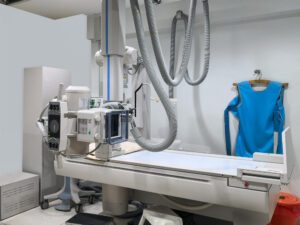Not all serious medical conditions require surgery. Interventional radiology (IR) is a cutting-edge specialty that allows doctors to treat a wide range of issues—like blocked arteries, varicose veins, fibroids, and even tumors—using tiny incisions and real-time imaging.
At Aria Vascular, we specialize in image-guided, minimally invasive procedures that help patients heal faster, experience less pain, and avoid the risks of traditional surgery. Here are seven of the most common conditions we treat using interventional radiology.
1. Peripheral Artery Disease (PAD)
Peripheral Artery Disease (PAD) affects millions of Americans, especially those with diabetes or a history of smoking. It occurs when arteries in the legs narrow due to plaque buildup, limiting blood flow.
Symptoms:
- Leg pain when walking (claudication)
- Numbness or weakness in the legs
- Non-healing wounds or ulcers on feet
IR Treatments:
- Balloon angioplasty – opens the artery using an inflatable balloon
- Stenting – keeps the artery open after angioplasty
- Atherectomy – removes plaque using a tiny cutting device
2. Varicose Veins and Venous Insufficiency
Varicose veins are more than just a cosmetic concern—they may signal poor circulation and valve failure in leg veins.
Symptoms:
- Bulging, twisted veins
- Leg heaviness or swelling
- Skin discoloration or itching
IR Treatments:
- Endovenous laser therapy (EVLT)
- Radiofrequency ablation (RFA)
- Foam sclerotherapy
These procedures close off faulty veins and reroute blood flow to healthy vessels—typically with no downtime.
3. Deep Vein Thrombosis (DVT)
DVT occurs when a blood clot forms in a deep vein, usually in the leg. If untreated, it can lead to a life-threatening pulmonary embolism (PE).
Symptoms:
- Sudden leg swelling or pain
- Red or warm skin on the leg
- Shortness of breath (if clot travels)
IR Treatments:
- Catheter-directed thrombolysis – delivers clot-busting drugs directly to the clot
- Mechanical thrombectomy – physically removes the clot
4. Uterine Fibroids
Fibroids are non-cancerous tumors in the uterus that can cause heavy bleeding and pelvic pain.
Symptoms:
- Heavy menstrual bleeding
- Pelvic pressure or pain
- Frequent urination
IR Treatments:
- Uterine Fibroid Embolization (UFE): Tiny particles are injected into the arteries supplying the fibroids, cutting off their blood supply and shrinking them.
5. Aneurysms (Aortic and Visceral)
An aneurysm is a dangerous ballooning of a blood vessel that can rupture if not treated.
Common Types:
- Abdominal aortic aneurysm (AAA)
- Thoracic aortic aneurysm
- Splenic or renal (visceral) aneurysm
IR Treatments:
- Endovascular stent grafting – reinforces the weakened artery
- Embolization – blocks blood flow to the aneurysm to prevent rupture
6. Liver and Kidney Tumors
Certain tumors, including hepatocellular carcinoma (HCC) and renal cell carcinoma (RCC), can be treated using minimally invasive techniques.
IR Treatments:
- Radioembolization (Y90) – delivers radiation directly to the tumor
- Chemoembolization – delivers chemotherapy while cutting off blood supply
- Cryoablation – freezes and destroys the tumor
IR offers an option when surgery isn’t possible or as an adjunct to systemic therapy.
7. Portal Hypertension & GI Disorders (TIPS)
Patients with liver disease may develop portal hypertension, leading to complications like ascites and esophageal varices
IR Treatments:
- TIPS (Transjugular Intrahepatic Portosystemic Shunt): A small stent is placed inside the liver to create a new blood pathway, reducing portal pressure.
This is often life-saving for patients with cirrhosis or liver failure symptoms.
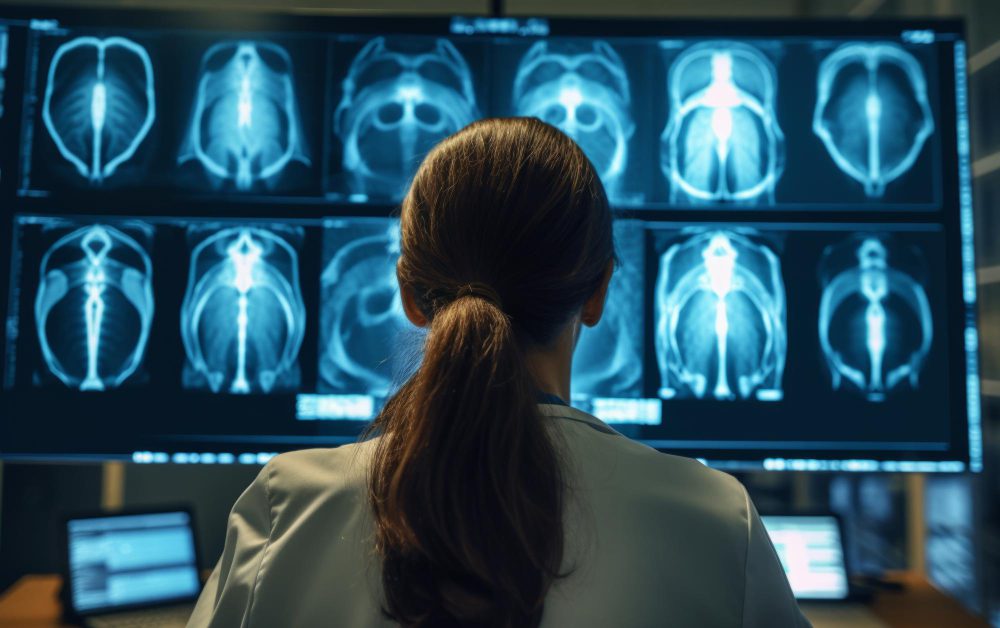
Why Choose Interventional Radiology?
Compared to traditional surgery, IR offers:
- Less pain
- Smaller incisions
- Faster recovery
- No general anesthesia
- Outpatient or short-stay procedures
- Lower cost and fewer complications
At Aria Vascular, our team provides compassionate care using the most advanced imaging and techniques available.
When to See an Interventional Radiologist
You may benefit from IR if:
- You’ve been diagnosed with one of the conditions above
- You want to avoid open surgery
- You’ve been referred by your primary care doctor or specialist
At Aria Vascular, our team provides compassionate care using the most advanced imaging and techniques available.
Frequently Asked Questions about Vascular Surgeons
What conditions are treated with interventional radiology?
IR treats conditions like PAD, DVT, varicose veins, fibroids, tumors, and aneurysms.
Is interventional radiology an alternative to surgery?
Yes, many conditions can be treated with IR instead of traditional surgery.
Is uterine fibroid embolization safe?
Yes, UFE is a safe, effective, and minimally invasive alternative to fibroid surgery.
Can DVT be treated without blood thinners?
Yes, IR offers mechanical clot removal and localized thrombolysis as alternatives.

